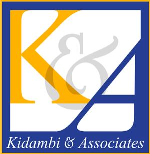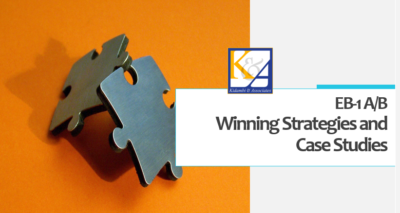EB-1 Visa
EB-1 is an immigrant first-preference visa that is employment-based, if you have an extraordinary ability (EB1A), are an outstanding professor or researcher (EB1B), or are a multinational executive or manager(EB1C).
These videos are excerpts from a recent EB-1 webinar that focused on the Employment Based First Preference – Extraordinary Ability and Outstanding Professors and Researchers (EB-1A and EB-1B) categories. They deal with case studies of cases that our office successfully processed recently. The stories and fact patterns may be similar to your own situation, but even if they are not, we are happy to review your background and come with options that may be best suited for you.
Our approach to processing EB-1 Visas
In researching a recent case for an Outstanding Researcher in the field of analytical chemistry, we found that the Beneficiary of the Petition was involved in pioneering research for a company where one half of the employees (over 100 employees) of the Company had the minimum of a Ph.D. degree. We worked closely with the Petitioner for weeks to find a way to present information without compromising the confidentiality and sensitive nature of the research. Ultimately, the Petition was filed with compelling information and approved in record time without a single question being raised. When researching and preparing EB-1 petitions, we pay special attention to individual requirements and work tirelessly to produce a quality petition. Please contact us to discuss your options.
EB-1 Eligibility and Filing
Aliens with extraordinary ability are those with “extraordinary ability in the sciences, arts, education, business, or athletics which has been demonstrated by sustained national or international acclaim and whose achievements have been recognized in the field through extensive documentation.” You must be one of “that small percentage who have risen to the very top of the field of endeavor,” to be granted this classification. For example, if you receive a major internationally recognized award, such as a Nobel Prize, you will qualify for an EB-1 classification. Other awards may also qualify if you can document that the award is in the same class as a Nobel Prize. Since few workers receive this type of award, alternative evidence of EB-1 classification based on at least three of the types of evidence outlined below, is permitted.
The worker may submit “other comparable evidence” if the following criteria do not apply:
- Receipt of lesser nationally or internationally recognized prizes or awards for excellence;
- Membership in associations in the field which demand outstanding achievement of their members;
- Published material about the alien in professional or major trade publications or other major media;
- Evidence that the alien has judged the work of others, either individually or on a panel;
- Evidence of the alien’s original scientific, scholarly, artistic, athletic, or business-related contributions of major significance to the field;
- Evidence of the alien’s authorship of scholarly articles in professional or major trade publications or other major media;
- Evidence that the alien’s work has been displayed at artistic exhibitions or showcases;
- Performance of a leading or critical role in distinguished organizations;
- Evidence that the alien commands a high salary or other significantly high remuneration in relation to others in the field;
- Evidence of commercial successes in the performing arts.




